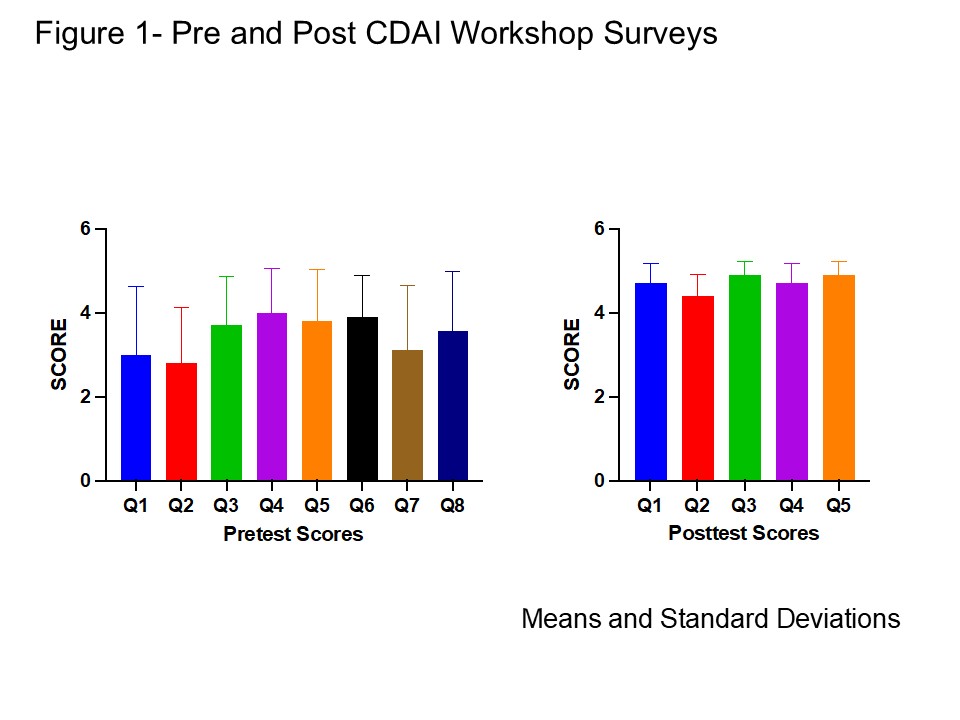Session Information
Session Type: Poster Session C
Session Time: 10:30AM-12:30PM
Background/Purpose: The Clinical Disease Activity Index (CDAI) is one of six assessment measures for rheumatoid arthritis (RA) recommended for management of RA in clinical practice. RA assessment measures were developed and validated for clinical research but since adoption of treat-to-target (TTT) principles as the standard of care for RA, there is a need for professional education to implement these measures in the clinic. As the CDAI does not require laboratory data, this RA composite outcome measure is preferred for the point-of-care management of RA. Standardization of joint examination technique has been shown to decrease interobserver variability in performing the CDAI. The purpose of this study was to create a medical educational workshop curriculum for learners and providers to improve knowledge and familiarity with the CDAI in RA management.
Methods: An educational workshop for the CDAI was developed and this curriculum proposal was presented at our institutional Rheumatology grand rounds for process improvement. Based on the feedback from this presentation, a 6-minute video demonstrating a 28 joint count exam was then developed (Image 1). 8 months later, Rheumatology providers and learners, including rheumatology fellows, were invited to a CDAI education workshop. The workshop included learning objectives, an 8-question pre-and 5 question post-workshop questionnaire, didactic presentation, a joint examination video followed by a series of three RA case discussions. Time was built in for group discussion on CDAI score on the RA cases. The workshop ended with a post-workshop questionnaire. Data were analyzed using descriptive statistics and t-tests to compare groups. A P value of < 0.05 was considered significant.
Results: The workshop was facilitated by a second-year rheumatology fellow and a rheumatology attending physician. There were 10 participants including rheumatology fellows, advanced practice providers, and attending physicians. All participants completed the pre and post-knowledge questionnaire (Table 1). The mean participant response for confidence in performing CDAI prior to the curriculum was a mean of 3 (SD 1.63), based on a 5-point Likert scale. After the curriculum, the likelihood of performing CDAI in clinic was a mean of 4.7 (SD 0.48). Prior to the workshop, confidence in performing the provider global was 3.1 (SD 1.54) and improved to 4.9 (SD 0.32). Similarly, confidence in assessing patient global activity, increased from 3.6 (SD 1.42) to 4.9 (SD 0.31) after the workshop. Overall, the participants responded that the course was helpful in increasing awareness and confidence in performing the CDAI. Pre and post means improved significantly after the workshop (p=0.0001) suggesting generalized knowledge improvement from the training workshop.
Conclusion: A clinical educational workshop on CDAI for Rheumatology providers improved self-reported knowledge of the CDAI for rheumatology training. Further investigation is needed to know if the education workshop translates into higher and proper utilization of CDAI in clinical care.
To cite this abstract in AMA style:
Rubia A, Olsen N, Suman S, Banks S, Albano Aluquin S, Pepper K, June R. Clinical Disease Activity Index (CDAI) for Rheumatoid Arthritis: A Clinical Educational Workshop [abstract]. Arthritis Rheumatol. 2025; 77 (suppl 9). https://acrabstracts.org/abstract/clinical-disease-activity-index-cdai-for-rheumatoid-arthritis-a-clinical-educational-workshop/. Accessed .« Back to ACR Convergence 2025
ACR Meeting Abstracts - https://acrabstracts.org/abstract/clinical-disease-activity-index-cdai-for-rheumatoid-arthritis-a-clinical-educational-workshop/


.jpg)
.jpg)